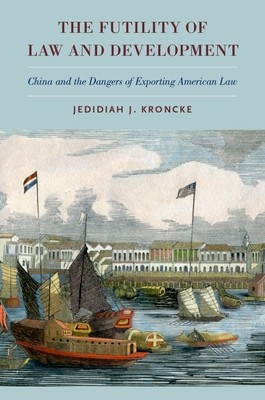
- We will send in 10–14 business days.
- Author: Jedidiah J Kroncke
- Publisher: Oxford University Press, USA
- ISBN-10: 0190233524
- ISBN-13: 9780190233525
- Format: 15.5 x 23.6 x 3.3 cm, hardcover
- Language: English
- SAVE -10% with code: EXTRA
Reviews
Description
For all the attention paid to the Founder Fathers in contemporary American debates, it has almost been wholly forgotten how deeply they embraced an ambitious and intellectually profound valuation of foreign legal experience. Jedidiah Kroncke uses the Founders' serious engagement with, and often admiration for, Chinese law in the Revolutionary era to begin his history of how America lost this Founding commitment to legal cosmopolitanism and developed a contemporary legal culture both parochial in its resistance to engaging foreign legal experience and universalist in its messianic desire to export American law abroad. Kroncke reveals how the under-appreciated, but central role of Sino-American relations in this decline over two centuries, significantly reshaped in the early 20th century as American lawyer-missionaries helped inspire the first modern projects of American humanitarian internationalism through legal development. Often forgotten today after the rise of the Chinese
Communist Party in 1949, the Sino-American relationship in the early 20th century was a key crucible for articulating this vision as Americans first imagined waves of Americanization abroad in the wake of China's 1911 Republican revolution.
EXTRA 10 % discount with code: EXTRA
The promotion ends in 16d.17:22:08
The discount code is valid when purchasing from 10 €. Discounts do not stack.
- Author: Jedidiah J Kroncke
- Publisher: Oxford University Press, USA
- ISBN-10: 0190233524
- ISBN-13: 9780190233525
- Format: 15.5 x 23.6 x 3.3 cm, hardcover
- Language: English English
For all the attention paid to the Founder Fathers in contemporary American debates, it has almost been wholly forgotten how deeply they embraced an ambitious and intellectually profound valuation of foreign legal experience. Jedidiah Kroncke uses the Founders' serious engagement with, and often admiration for, Chinese law in the Revolutionary era to begin his history of how America lost this Founding commitment to legal cosmopolitanism and developed a contemporary legal culture both parochial in its resistance to engaging foreign legal experience and universalist in its messianic desire to export American law abroad. Kroncke reveals how the under-appreciated, but central role of Sino-American relations in this decline over two centuries, significantly reshaped in the early 20th century as American lawyer-missionaries helped inspire the first modern projects of American humanitarian internationalism through legal development. Often forgotten today after the rise of the Chinese
Communist Party in 1949, the Sino-American relationship in the early 20th century was a key crucible for articulating this vision as Americans first imagined waves of Americanization abroad in the wake of China's 1911 Republican revolution.


Reviews